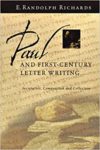 Welcome to this series which gives a basic outline of the sequence from the initial creation of Romans, its transportation to the Roman Church, and the probable method it would have been received by the Roman Church. Its long. It has six parts. Here they are;
Welcome to this series which gives a basic outline of the sequence from the initial creation of Romans, its transportation to the Roman Church, and the probable method it would have been received by the Roman Church. Its long. It has six parts. Here they are;
01 – Author, letter, and audience (current)
- 02 – Framing Romans (Rom 1-2)
- 03 – Framing Romans (Rom 2-3)
- 04 – Framing Romans (Rom 3-5)
- 05 – Framing Romans (Rom 2-1)
- 06 – Sneak Peek at the scripted text
a) Paul dictated the letter, Tertius writes
The apostle Paul was the author of the letter of Romans (Rom 1.1). In the introduction of the letter Paul names himself as the author.
[1:1] Paul, a servant of Christ Jesus, called to be an apostle, set apart for the gospel of God (Rom 1.1)
However,
Paul did not write Romans. Paul dictated Romans to Tertius his scribe, who wrote down what he said.
[22] I Tertius, who wrote this letter, greet you in the Lord. (Rom 16.22).
Paul confirms this earlier in Romans saying,
‘I speak in a human way’ (Rom 3.5b)
and
‘Now I am speaking to you Gentiles’. (Rom 11.13)
Paul says he is speaking (Gk. λέγω). He is speaking before Tertius, as if to the Gentile believers in the Roman church. For these reasons the paper refers to Paul’s communication in the letter as speech, and describes the utterances of the text as Paul speaking.
As the letter is nearing its completion, Paul does refer to Romans as if he was writing saying;
‘But on some points I have written to you very boldly by way of reminder’ (Rom 15.15)
What Paul is communicating by this statement, is that he is the author and therefore the owner of the letter. He does not mean he is the person who actually wrote it down on papyrus. We later find out Tertius is that person. Paul is speaking as if to the Roman believers, but he is also aware Tertius is writing what he says down on his behalf. Let me draw what this looks like using an example text from Romans 1.
 Throughout this section ‘Dialogue’, I will be stringing together a series of main points. The first is;
Throughout this section ‘Dialogue’, I will be stringing together a series of main points. The first is;
D1) Paul spoke the text aloud in front of his scribe Tertius who wrote it down (Rom 16.22; 11.13).
b) Paul instructs letter bearer in the letters delivery
Paul’s intention was to send the letter to the Roman Church. This is made clear when Paul says;
[7] To all those in Rome who are loved by God and called to be saints: (Rom 1:7)
and
[15] So I am eager to preach the gospel to you also who are in Rome. (Rom 1.15)
The letter had to get to Rome and Paul wasn’t going to deliver it himself. So Paul must have instructed a trusted letter bearer to take the letter to the Roman Church. Scholars today suggest from Rom 16.1-2 that Phoebe carried the letter to Rome.
16 I commend to you our sister Phoebe, a servant of the church at Cenchreae, that you may welcome her in the Lord in a way worthy of the saints, and help her in whatever she may need from you, for she has been a patron of many and of myself as well. (Rom 16.1-2)
The text suggests that Paul hoped or expected Phoebe would still be at the Roman church when they received this instruction in order that she would benefit from his request.
As we will find out later there are a number of places where the letter is open to misinterpretation. I assume Paul was aware of that and took steps to avoid miscommunication to his audience. The letter bearer is the only person capable of transmitting that information.
Other than Paul, no one was more qualified to communicate the letter as Paul intended and correct any misunderstanding than the people present when he initially dictated the letter. If we assume Phoebe was present, we know she would have witnessed this process and understood how the letter was intended to be orally delivered. Otherwise if she was not there at the time, at some point Paul must have made sure she was aware of any areas of possible misinterpretation, so she could influence the way the letter was communicated to the Roman believers accordingly.
c) Letter bearer takes letter to the Rome
This is fairly self explanatory.
d) The letter is read aloud to the Roman Churches according to Paul’s instruction
How did Paul intend the audience would receive his letter?
In the first century most letters were read aloud to their audiences. Consider some first century examples of how audiences interacted with scripture. Paul says to Timothy;
[12] Let no one despise you for your youth, but set the believers an example in speech, in conduct, in love, in faith, in purity. [13] Until I come, devote yourself to the public reading of Scripture, to exhortation, to teaching. [14] Do not neglect the gift you have, which was given you by prophecy when the council of elders laid their hands on you. [15] Practice these things, immerse yourself in them, so that all may see your progress. [16] Keep a close watch on yourself and on the teaching. Persist in this, for by so doing you will save both yourself and your hearers. (1 Tim 4:12-16)
Paul instructs Timothy in the primary way scripture was interacted with in the first century saying, ‘devote yourself to the public reading of scripture’ and by keeping a close watch on himself and the teaching Timothy will save his hearers. In Colossians Paul says,
‘And when this letter has been read among you, have it also read in the church of the Laodiceans; and see that you also read the letter from Laodicea.’ (Col 4.16)
Paul imagines that the letter will be ‘read among’ them. Its probable the letter will be read aloud by one person when they gather so they can all hear, rather than they all read it individually when they are all together. Likewise in Thessalonians,
‘I put you under oath before the Lord to have this letter read to all the brothers.’ (1 Thes 5.27)
We can see from these quotes, Paul expects his letters to be read aloud to groups of believers when they gather together.
This same combination of public reading by the one, and hearing by the many is paired in Revelation. The apostle John says in Revelation,
[3] Blessed is the one who reads aloud the words of this prophecy, and blessed are those who hear, and who keep what is written in it, for the time is near. (Rev 1.3).
and there is a much repeated phrase that reinforces this first statement;
[7] He who has an ear, let him hear what the Spirit says to the churches.’ (Rev 2.7,11,17,29; 3.6,13,22)
When John wrote revelation he expected the letter to be read aloud to the churches he was sending it to. Justin Martyr likewise, describes the early churches typical method of interacting with the scriptures,
“And on the day called Sunday, all who live in cities or in the country gather together to one place, and the memoirs of the apostles or the writings of the prophets are read, as long as time permits; then, when the reader has ceased, the president verbally instructs, and exhorts to the imitation of these good things. Then we all rise together and pray, and, as we before said, when our prayer is ended, bread and wine and water are brought, and the president in like manner offers prayers and thanksgivings, according to his ability, and the people assent, saying Amen.” (Ch 67, First Apology, Justin Martyr)
Randolph Richards in Paul and First-Century Letter Writing: Secretaries, Composition and Collection says, ‘Romans has more oratorical rhetoric and the strongest of oral features in Paul’s letters.’ He argues that Paul sent his representative to read his letter aloud to the Roman Christian audience.
Stirewalt in Paul, the Letter Writer says, ‘Paul is writing letters socially and theologically bound to the oral word. He does not conceive of a context in which, on reception, his word is not reanimated by oral speech.’
Douglas Campbell in The Deliverance of God: An Apocalyptic Rereading of Justification in Paul takes the idea of reading the letter aloud and goes further saying,
“For most people in the ancient world, reading was an aural and usually corporate experience. The people themselves were largely illiterate; their ‘reading’ was an experience of hearing the text. Indeed, even private reading was usually done aloud. This fundamentally oral/aural world was the setting in which Paul’s letters were composed and read – a setting we must recover, as best we can, if we are to hear them as Paul’s Roman Christian auditors probably did.
Paul’s letters were read out aloud by someone – presumably the letter bearer – to an audience. They were performed. In this sense, each letter exists for us rather like a script of an old play – but a script that often preserves only one actor’s lines (although an important one). …
In short, interpretation is best understood as the recovery of a set of performances by a letter bearer to an audience of listening believers.” (p531, ibid)
My main point here is – as a general rule;
Letters addressed to groups of people in the first century were intended to be read aloud to their audiences.
Letters written to individuals were obviously a likely exception. But our default assumption when we know a letter was written to a group of people, should be that the author assumed the letter would have been read aloud to them. They heard it, they didn’t read it. Same applies to Romans. There is a burden of proof for any interpreter of Romans who denies this.
We can assume with reasonable confidence that Paul expected the letter to be read aloud in a similar manner as he presented it to Tertius.

The believers in Rome didn’t meet in a single church. There were several house churches. (Dunn, cf. Rom 16; Campbell, p531) The creation of letters as long as Romans was time consuming and expensive in the first century (Richards). The time a trained scribe took to copy the four gospels has been estimated at six weeks (p25, Gospels and Acts: The First Three Gospels v. 1). So I assume it would take around a week to produce a single copy of Romans. In light of this, the letter bearer most likely moved from house church to house church with the original text.
What would Paul’s expectation be for the letter bearers involvement in the oral delivery of the letter? Paul’s oral delivery of the letter was assessed by him, Tertius and others in the room at the time.
Did Phoebe read aloud Paul’s letter to the Roman house churches according to Paul’s instruction? We don’t know. What we can assume is that if she didn’t, she would have made sure the letter was read aloud according to Paul’s instruction. So either way, whether the letter was read aloud by her or another, the letter would have been read aloud to the house churches according to Paul’s instructions.
Does it cause a problem if Phoebe was the lector? Does it conflict with Paul’s command that women should not teach (1 Tim 2.12)? Not necessarily, in New Testament times, the way people understood the role of ‘teacher’ was quite specific (see John Dickson’s, Hearing her voice, A case for women giving sermons) and did not include the public reading of scripture or its interpretation. Phoebe could well have read out the letter of Romans with Paul’s instructions.
I have already argued these main points.
D1) Paul spoke the text aloud in front of his scribe Tertius who wrote it down (Rom 16.22; 11.13).
Now I will build on this adding;
D2) The Roman audiences had the text read out aloud in front of them according to Paul’s instructions.
e) The Roman Church consisted of Jewish and Gentile believers
Paul explicitly mentions his listeners in Rome have faith. The believe the gospel.
8 First, I thank my God through Jesus Christ for all of you, because your faith is proclaimed in all the world. 9 For God is my witness, whom I serve with my spirit in the gospel of his Son, that without ceasing I mention you 10 always in my prayers, asking that somehow by God’s will I may now at last succeed in coming to you. 11 For I long to see you, that I may impart to you some spiritual gift to strengthen you— 12 that is, that we may be mutually encouraged by each other’s faith, both yours and mine. (Rom 1.8-12)
More specifically, the letter directly addresses Gentile believers. In a verse I quoted before Paul speaks to the Gentile believers saying,
‘Now I am speaking to you Gentiles’. (Rom 11.13)
Clearly the Roman house churches included Gentile believers. There is other evidence as well. Paul says;
[5] through whom we have received grace and apostleship to bring about the obedience of faith for the sake of his name among all the nations [Gentiles], [6] including you who are called to belong to Jesus Christ, (Rom 1.5-6)
Its harder to prove the Roman Churches included Jewish believers. I quoted Rom 11.13 above and it also proves the opposite. It describes Paul switching from speaking to the wider group to specifically the Gentiles in the group. This suggesting the wider group included Jewish believers.
Paul also singles out another specific group in his audience saying,
Or do you not know, brothers—for I am speaking to those who know the law (Rom 7.1)
These could be either Gentile ‘god-fearers’ educated in the law or Jews. Both ‘know the law’.
Consider Rom 14.1-3;
[14:1] As for the one who is weak in faith, welcome him, but not to quarrel over opinions. [2] One person believes he may eat anything, while the weak person eats only vegetables. [3] Let not the one who eats despise the one who abstains, and let not the one who abstains pass judgment on the one who eats, for God has welcomed him. (Rom 14.1-3)
Paul is giving instructions to a group of people he believes includes two types of people. Those who are weak in faith who eat only vegetables, and those who believe they may eat anything. The Jews typically obeyed the food laws in their law. Paul is most probably speaking about them when he speaks of the ‘weak in faith’ who only eat vegetables.
We can assume from these inferences Paul intends the letter to be read out aloud to Jewish and Gentile believers.
I have already argued these main points.
D1) Paul spoke the text aloud in front of his scribe Tertius who wrote it down (Rom 16.22; 11.13).
D2) The Roman audiences had the text read out aloud in front of them according to Paul’s instructions.
I will build on this adding;
D3) The Roman churches consisted of Jewish and Gentile believers.
Displaying the context of the text by using cartoons
Each section where I discuss Romans 1-4 will include a cartoon / picture. The cartoons specifically identify important people and groups of people who are involved in the performance of the letter. The cartoon below shows Paul and a Roman Christian audience consisting of both Jewish and Gentile believers.

Click to enlargeWhy do I do this? I’m bringing to the fore some fundamental principles of biblical hermeneutics. I want to help readers of this paper to;
Recognise the interplay between author, text and audience.
Recognise the letter was intended to be read aloud in front of a listening audience of Jewish and Gentile believers, and
Consider the illocutionary acts involved in the performance.
What’s an illocutionary act you ask?
Speech Act Theory and Illocutionary Acts
An illocutionary act is an aspect of Speech-Act theory. An illocution is an act performed in saying something;
For example;
As a greeting (in saying, “Hi John!”, for instance), apologizing (“Sorry for that!”), describing something (“It is snowing”), asking a question (“Is it snowing?”), making a request and giving an order (“Could you pass the salt?” and “Drop your weapon or I’ll shoot you!”), or making a promise (“I promise I’ll give it back”) are typical examples of “speech acts” or “illocutionary acts”.
In saying, “Watch out, the ground is slippery”, Mary performs the speech act of warning Peter to be careful.
In saying, “Ladies and gentlemen, please give me your attention”, Mary requests the audience to be quiet.
In saying, “I now pronounce you man and wife”, a minister seals the marriage between a couple
In saying, “You’re fired!”, a boss terminates a working relationship with his employee.
“In indirect speech acts the speaker communicates to the hearer more than he actually says by way of relying on their mutually shared background information, both linguistic and nonlinguistic. Together with general powers of rationality and inference on the part of the hearer.”
For example;
‘Do you have the time?’ – response: ‘6pm’;
‘Its cold in here’ – response: the person will turn the heater on.
The intention of a speaker’s utterance is to generate responses from their audience. Through considering the author, written text and the audience, one can derive likely responses from the audience. From these responses one can hopefully get a better understanding of the authors intentions.
When Paul first uttered what made up the contents of Romans to Tertius he performed illocutionary acts.
When the letter was performed in front of the mix of Jew and Gentile believers in Rome, it also generated illocutionary acts.
The original audience of Roman believers were under the effects of illocutionary forces generated by the performance of the Romans text.
So when I eventually step through my interpretation of Romans 1-4 I will be asking the following questions of you (the reader of this post);
What do you think reading this section aloud would do to a group of Jewish and Gentile believers?
How do you think the JEWISH believers would respond?
How do you think the GENTILE believers would respond?
What do you think the effect of saying this to an audience of Jewish and Gentile believers would have on their GROUP DYNAMICS?
Why do you think Paul crafted this performance this way? What was his intent?
The answers to these questions may vary from person to person. But, maybe we will come up with similar answers. It does depend on existing preconceptions of what the text is about, what people have always told you to believe about this text and many other factors. None the less, I will keep asking readers of this paper these questions in order to make them think what effect Paul wanted to have on the original audience of Jewish and Gentile believers.
Main Points
In this section I have introduced some simple ideas I believe are often overlooked in the study of Romans 1-4;
D1) Paul spoke the text aloud in front of his scribe Tertius who wrote it down (Rom 16.22; 11.13).
D2) The Roman audiences had the text read out aloud in front of them according to Paul’s instructions.
D3) The Roman churches consisted of Jewish and Gentile believers (Rom 1.8).
In the next post I will start to look at Romans 1-4 in greater detail.
Copyright © Joshua Washington and thescripturesays, 2014. All Rights Reserved.





